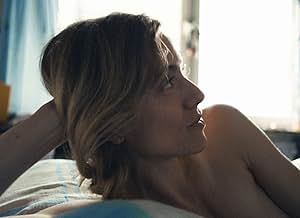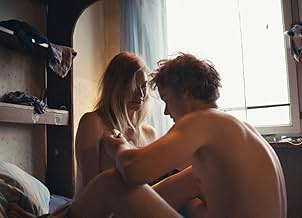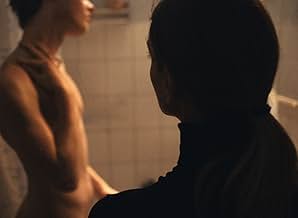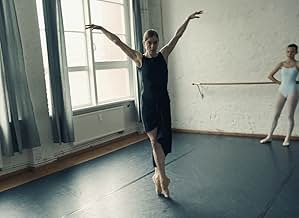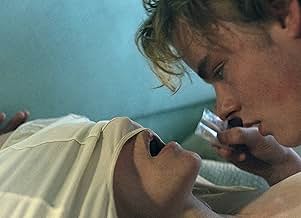Afin de se concentrer sur sa carrière, une professeure de ballet vit séparée de son jeune fils, qui a grandi avec sa mère. Lorsqu'elle le retrouve après des années, une affection se développ... Tout lireAfin de se concentrer sur sa carrière, une professeure de ballet vit séparée de son jeune fils, qui a grandi avec sa mère. Lorsqu'elle le retrouve après des années, une affection se développe qui va bien au-delà de l'amour maternel.Afin de se concentrer sur sa carrière, une professeure de ballet vit séparée de son jeune fils, qui a grandi avec sa mère. Lorsqu'elle le retrouve après des années, une affection se développe qui va bien au-delà de l'amour maternel.
- Réalisation
- Scénario
- Casting principal
- Récompenses
- 1 victoire et 4 nominations au total
Sarah Nevada Grether
- Nadja
- (as Sarah Grether)
- …
Avis à la une
Review of Grand Jeté (2023)
Grand Jeté is a film that explores the complicated, sometimes messy nature of motherhood and the emotional weight of choices. It tells the story of a ballet teacher who, in pursuit of her career, becomes estranged from her son, leaving him to be raised by her mother. Years later, when they meet again, their relationship becomes increasingly intense, leading to a bond that crosses the line between a mother's love and something darker.
As I watched the film, I couldn't help but feel unsettled by the growing connection between mother and son. The way their relationship shifts is disturbing but undeniably human-two people trying to reconnect after years of separation, but in a way that feels more like an emotional affair than the reunion of mother and child. It raises difficult questions about love, guilt, and the blurry boundaries between what is acceptable and what is not.
The mother, trying to balance her passion for ballet with the need to care for her son, is deeply flawed but relatable. Her struggle is palpable. She loves him, yet her actions reveal a selfishness, a detachment, even in the midst of wanting to make up for lost time. Her son, now an adult, is caught in the middle, confused by the affection that feels too heavy, too intimate for what is supposed to be a motherly bond.
I think what the movie does best is show how complicated relationships can be when people try to reconnect after years apart. But honestly, I couldn't shake the feeling that the film was too subtle at times, leaving me wanting more depth in their emotional journey. It was hard to fully connect with the characters, especially when the emotional tension felt more uncomfortable than moving.
While the idea of a mother and son becoming emotionally entangled like this is disturbing, it does shine a light on the psychological complexities of love and desire. It's not a story of pure affection-it's about what happens when love becomes suffocating and boundaries get blurred. I won't lie, I felt conflicted watching it.
Overall, Grand Jeté is a film that sticks with you, though it's uncomfortable and at times hard to watch, where a son develop unconscious emotional or romantic feelings for his mother.
Grand Jeté is a film that explores the complicated, sometimes messy nature of motherhood and the emotional weight of choices. It tells the story of a ballet teacher who, in pursuit of her career, becomes estranged from her son, leaving him to be raised by her mother. Years later, when they meet again, their relationship becomes increasingly intense, leading to a bond that crosses the line between a mother's love and something darker.
As I watched the film, I couldn't help but feel unsettled by the growing connection between mother and son. The way their relationship shifts is disturbing but undeniably human-two people trying to reconnect after years of separation, but in a way that feels more like an emotional affair than the reunion of mother and child. It raises difficult questions about love, guilt, and the blurry boundaries between what is acceptable and what is not.
The mother, trying to balance her passion for ballet with the need to care for her son, is deeply flawed but relatable. Her struggle is palpable. She loves him, yet her actions reveal a selfishness, a detachment, even in the midst of wanting to make up for lost time. Her son, now an adult, is caught in the middle, confused by the affection that feels too heavy, too intimate for what is supposed to be a motherly bond.
I think what the movie does best is show how complicated relationships can be when people try to reconnect after years apart. But honestly, I couldn't shake the feeling that the film was too subtle at times, leaving me wanting more depth in their emotional journey. It was hard to fully connect with the characters, especially when the emotional tension felt more uncomfortable than moving.
While the idea of a mother and son becoming emotionally entangled like this is disturbing, it does shine a light on the psychological complexities of love and desire. It's not a story of pure affection-it's about what happens when love becomes suffocating and boundaries get blurred. I won't lie, I felt conflicted watching it.
Overall, Grand Jeté is a film that sticks with you, though it's uncomfortable and at times hard to watch, where a son develop unconscious emotional or romantic feelings for his mother.
And maybe even "wrong" love - well no pun intended as always. There have been other movies that have delved into the human psyche and may have given us a better overall picture (I reckon that can count as a pun too) ... but this is also quite well made. It never reaches those heights ... but it is well played and may be a bit more "silent" and slow than other movies.
Try to suspend your disbelief, be prepared to be shocked (not so much from the nudity hopefully, but the relationship the two main characters have ... and their "connection") ... also be prepared to fill in the blanks ... to read between the lines (silences) ... the movie challenges the viewer ... performances are really good. And casting a real dancer in the main role may have helped it a lot.
Try to suspend your disbelief, be prepared to be shocked (not so much from the nudity hopefully, but the relationship the two main characters have ... and their "connection") ... also be prepared to fill in the blanks ... to read between the lines (silences) ... the movie challenges the viewer ... performances are really good. And casting a real dancer in the main role may have helped it a lot.
As a kid watching 'Siskel and Ebert at the Movies',
I loved Roger Eberts description that movies take you to places you've never been and introduce you to people and lives you'll never encounter.
This movie fits that description freakishly well.
While it's a very watchable film, the characters come across as the last 3 survivors on earth ( there are NO supporting characters) and while fascinating to watch, their personalities fail to elicit any sympathy. I didn't like the characters; I didn't dislike the characters; but I was still too far removed to develop any empathy for anyone.
And for a movie set in Berlin, I expected at least some scenes of architecture, culture, etc, but alas, whereas I met characters I normally wouldn't meet, I never felt that I was traveling anywhere outside of 3-4 studio sets that could have been filmed anywhere.
This movie fits that description freakishly well.
While it's a very watchable film, the characters come across as the last 3 survivors on earth ( there are NO supporting characters) and while fascinating to watch, their personalities fail to elicit any sympathy. I didn't like the characters; I didn't dislike the characters; but I was still too far removed to develop any empathy for anyone.
And for a movie set in Berlin, I expected at least some scenes of architecture, culture, etc, but alas, whereas I met characters I normally wouldn't meet, I never felt that I was traveling anywhere outside of 3-4 studio sets that could have been filmed anywhere.
Just what is it about ballet dancers in movies that they all have to have gnarly feet, eating disorders, self harming issues, be generally unhealthy and be obsessive and plain crazy?
Well if you are expecting this movie to break from those tropes this is the wrong one. It even manages to throw in another disorder to the crazy ballerina pile, incest.
That is right this is a movie about a ballerina who apparently gave her son to her own mother to raise while she pursued her dancing career and now she is back in his life. But for some reason her and her son decide to embark on an incestuous affair. And that isn't a spoiler by the way that is the premise of this movie from the outset.
There is nothing really explored as to why this situation has occurred nor at any point does the son and mother discuss their motivations for their acts. It is basically numerous sex scenes with very little in the way of dialogue. Strangely enough the mother does seem to have a partner at the start of the movie but with him being replaced by the son he is never seen again. At no point is he there to ask what happened to the relationship, he is simply removed from the narrative. There are some hints that the mothers own parents were disturbed, yet its hardly enough to fill in the blanks of the narrative.
While this is similar in tone to The Piano Teacher it doesn't have the same emotional impact. Its also not surprising this was directed by a woman, its highly unlikely a man would have been given the green light to film such a movie. As people would have questioned his motives for making a movie about incest. Its also German and centred on Berlin where apparently anything goes. Maybe these movies are "trendy" in certain far left leaning places like there.
While it seems competently shot there are some very odd camera angle choices which can look absurd. There are also plenty of close ups of feet for some reason. There is also a very strange BDSM performance theatre scene involving the son, like I said this is all "very Berlin" in tone.
This is unlikely to be picked up by many platforms or to be seen by many people. Although I am sure that for those certain individuals who have a "thing" for the subject matter will be its biggest fans.
While some people are saying female directors are the future of cinema, based on this showing its unlikely cinema will survive.
A niche viewing experience based on the belief that taboo subjects should be on the big screen, produced by those who lack moral judgement and common sense.
The only plus was that at least the main character had the physique of a ballerina.
The ending is also very unsatisfying and doesn't resolve anything.
Well if you are expecting this movie to break from those tropes this is the wrong one. It even manages to throw in another disorder to the crazy ballerina pile, incest.
That is right this is a movie about a ballerina who apparently gave her son to her own mother to raise while she pursued her dancing career and now she is back in his life. But for some reason her and her son decide to embark on an incestuous affair. And that isn't a spoiler by the way that is the premise of this movie from the outset.
There is nothing really explored as to why this situation has occurred nor at any point does the son and mother discuss their motivations for their acts. It is basically numerous sex scenes with very little in the way of dialogue. Strangely enough the mother does seem to have a partner at the start of the movie but with him being replaced by the son he is never seen again. At no point is he there to ask what happened to the relationship, he is simply removed from the narrative. There are some hints that the mothers own parents were disturbed, yet its hardly enough to fill in the blanks of the narrative.
While this is similar in tone to The Piano Teacher it doesn't have the same emotional impact. Its also not surprising this was directed by a woman, its highly unlikely a man would have been given the green light to film such a movie. As people would have questioned his motives for making a movie about incest. Its also German and centred on Berlin where apparently anything goes. Maybe these movies are "trendy" in certain far left leaning places like there.
While it seems competently shot there are some very odd camera angle choices which can look absurd. There are also plenty of close ups of feet for some reason. There is also a very strange BDSM performance theatre scene involving the son, like I said this is all "very Berlin" in tone.
This is unlikely to be picked up by many platforms or to be seen by many people. Although I am sure that for those certain individuals who have a "thing" for the subject matter will be its biggest fans.
While some people are saying female directors are the future of cinema, based on this showing its unlikely cinema will survive.
A niche viewing experience based on the belief that taboo subjects should be on the big screen, produced by those who lack moral judgement and common sense.
The only plus was that at least the main character had the physique of a ballerina.
The ending is also very unsatisfying and doesn't resolve anything.
"Grand Jeté" is a heart-wrenching drama that explores the complexities of love and sacrifice. The film tells the story of a talented ballet teacher who is torn between her career aspirations and her responsibilities as a mother. After living apart from her young son for many years, she is unexpectedly reunited with him, and they soon discover an undeniable connection that goes beyond familial bonds.
The film's nuanced performances and stunning choreography create a poignant and moving portrayal of the beauty of dance and the power of family. The lead actress delivers a powerful performance, conveying the struggle of a mother who has had to put her dreams on hold in pursuit of her career. The scenes in which she dances the titular Grand Jeté are breathtaking and inspiring.
The themes of forgiveness, redemption, and self-discovery are beautifully woven into the plot, making "Grand Jeté" a thought-provoking and emotionally charged experience. The film's touching conclusion will leave you feeling uplifted and moved, a testament to the power of love and the healing potential of the arts.
Overall, "Grand Jeté" is a beautifully crafted film that showcases the talent of its cast and crew. It's a must-see for anyone who appreciates the beauty of dance and the complexities of human relationships.
The film's nuanced performances and stunning choreography create a poignant and moving portrayal of the beauty of dance and the power of family. The lead actress delivers a powerful performance, conveying the struggle of a mother who has had to put her dreams on hold in pursuit of her career. The scenes in which she dances the titular Grand Jeté are breathtaking and inspiring.
The themes of forgiveness, redemption, and self-discovery are beautifully woven into the plot, making "Grand Jeté" a thought-provoking and emotionally charged experience. The film's touching conclusion will leave you feeling uplifted and moved, a testament to the power of love and the healing potential of the arts.
Overall, "Grand Jeté" is a beautifully crafted film that showcases the talent of its cast and crew. It's a must-see for anyone who appreciates the beauty of dance and the complexities of human relationships.
Le saviez-vous
- AnecdotesEmil von Schönfels was 17 at the casting and 18 during the shooting.
- Bandes originalesKeepsake
Written by Carole Sabouraud
Performed by Edith Crash
Meilleurs choix
Connectez-vous pour évaluer et suivre la liste de favoris afin de recevoir des recommandations personnalisées
- How long is Grand Jeté?Alimenté par Alexa
Détails
- Date de sortie
- Pays d’origine
- Site officiel
- Langue
- Aussi connu sous le nom de
- Ґран-жете
- Lieux de tournage
- Eberswalde, Brandenburg, Allemagne(location)
- Sociétés de production
- Voir plus de crédits d'entreprise sur IMDbPro
- Durée1 heure 45 minutes
- Couleur
- Rapport de forme
- 1.50 : 1
Contribuer à cette page
Suggérer une modification ou ajouter du contenu manquant




